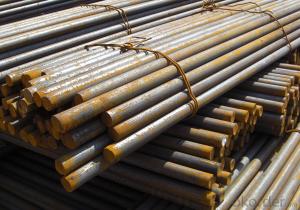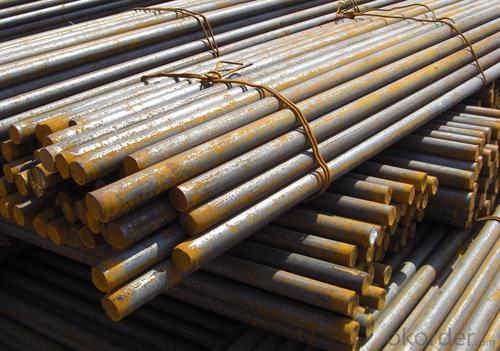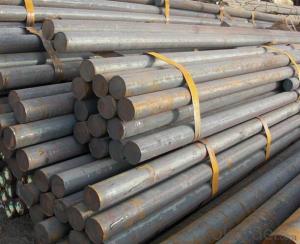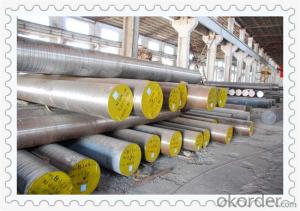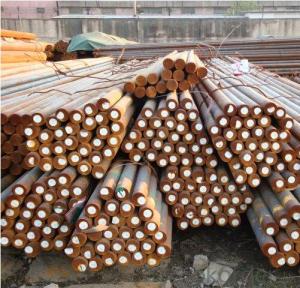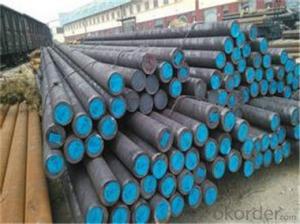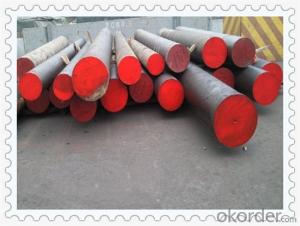Hot Forged Alloy Structure Steel Round Bars Special Steel
- Loading Port:
- China main port
- Payment Terms:
- TT OR LC
- Min Order Qty:
- 30 m.t.
- Supply Capability:
- 10000 m.t./month
OKorder Service Pledge
OKorder Financial Service
You Might Also Like
Specification
Steel bar is widely used in hardware, chemistry, foodstuff, medicine apparatus, making industry, computer or notebook components, etc. Common steel bar grade include Chinese Standard: 20#, 25#, 35#, 45#, 50#, 60#;Japan Standard: S20C, S25C, S35C, S45C, S55C, S60C;US Standard: AISI1020, AISI1040, AISI1045, AISI1050;Europe Standard: CK15, C. 22, C45, CK45, C60, CK60; C45E.
Chemical composition of steel bar
| Standard | C | Si | Mn | Cr | Ni | P/S ≤ |
| DIN | ≤0.15 | ≤1.0 | ≤2.0 | 18 | 9 | 0.03 |
| GB | ≤0.15 | ≤1.0 | ≤2.0 | 18 | 9 | 0.03 |
Product show
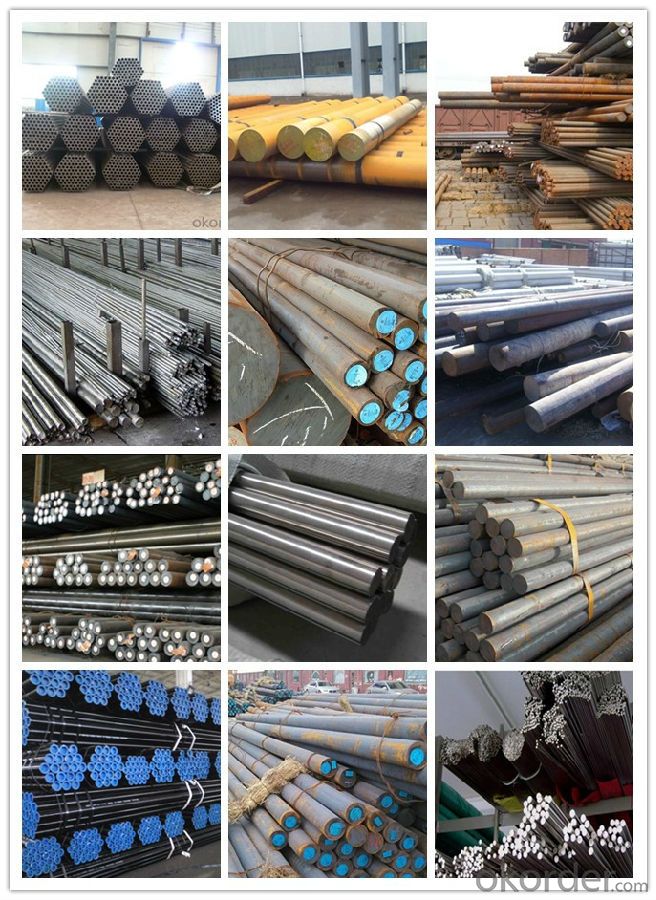
Workshop show
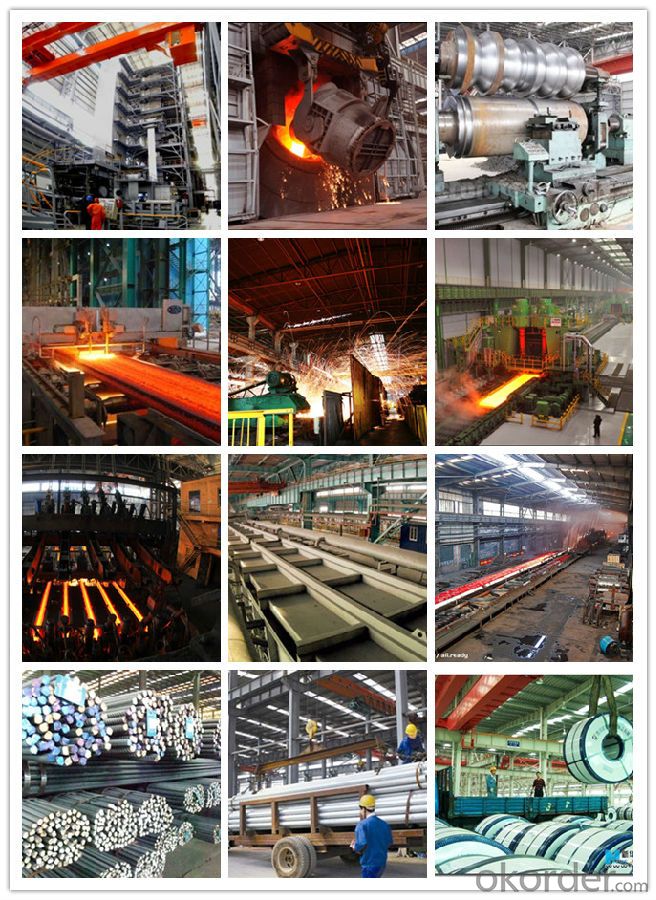
Shipping
1. FedEx/DHL/UPS/TNT for samples, Door-to-Door;
2. By Air or by Sea for batch goods, for FCL; Airport/ Port receiving;
3. Customers specifying freight forwarders or negotiable shipping methods!
Delivery Time: 3-7 days for samples; 5-25 days for batch goods.
Payment Terms
1.Payment: T/T, L/C, Western Union, MoneyGram,PayPal; 30% deposits; 70% balance before delivery.
2.MOQ: 1pcs
3.Warranty : 3 years
4.Package Informations: 1) EXPORT, In 20 feet (GW 25 ton) or 40 feet Container (GW 25 ton)
2)as customer's requirement
Main Product
Plastic Mould Steel
DIN 1.2311,1.2738,1.2083,1.2316 etc.
AISI P20,P20+Ni,420 etc.
JIS SUS420J2
Hot Work Steel
DIN 1.2344,1.2343,1.2367,1.2365,1.2581,1.2713 etc.
AISI H13,H11,H10,H21, etc.
JIS SKD61,SKD6,SKD5,SKT4 etc.
Cold Work Steel
DIN 1.2739, 1.2601, 1.2080, 1.2436, 1.2631, 1.263, 1.2510, 1.2327 etc.
AISI D2, D5, D3, D6, A8, A2, O1 etc.
JIS SKD10, SKD11, SKD1, SKS3 etc.
High Speed Steel
DIN 1.3343, 1.3243, 1.3247, 1.3355 etc.
AISI M2, M35, M42, T1 etc.
JIS SKH51, SKH35, SKH59, SKH2 etc.
Alloy Structural Steel
DIN 1.7035,1.6511,1.7220,1.7225 etc.
AISI 5140, 4340, 4135, 4140 etc.
JIS SCr440,SNCM439,SCM435,SCM440 etc.
Stainless & Carbon Steel or Others
DIN 1.4125,1.1191 etc
AISI 440C,1045, 1020 etc.
JIS SUS440C,S45C etc
Why choose us?
(1) The leading exporter in China special steel industry.
(2) Large stocks for various sizes, fast delivery date.
(3) Good business relationship with China famous factories.
(4) More than 7 years steel exporting experience.
(5) Good after-sales service guarantee.
- Q: Can special steel be used in the nuclear power industry?
- Yes, special steel can be used in the nuclear power industry. Special steel is often used for components such as reactor pressure vessels, steam generators, and fuel cladding in nuclear power plants. Special steel's high strength, resistance to corrosion, and ability to withstand high temperatures make it suitable for the demanding conditions and safety requirements of the nuclear power industry.
- Q: How does special steel contribute to reducing product waste?
- Special steel contributes to reducing product waste by offering superior strength, durability, and corrosion resistance. This allows manufacturers to produce longer-lasting and more reliable products, minimizing the need for frequent replacements. Additionally, special steel's high precision and customization capabilities enable the creation of components with tight tolerances, reducing the risk of assembly errors and subsequent product failures. Consequently, special steel helps optimize product performance and longevity, thereby reducing waste generated from premature product disposal.
- Q: How is special steel used in the production of surgical instruments?
- Special steel is used in the production of surgical instruments due to its unique properties such as corrosion resistance, high strength, and ability to maintain sharpness. This steel is specifically designed to meet the demanding requirements of surgical tools, ensuring durability and precision during procedures.
- Q: How does special steel perform in high-temperature oxidation?
- Special steel is specifically designed to have excellent performance in high-temperature oxidation. It has the ability to resist oxidation and maintain its mechanical properties even at elevated temperatures, making it highly reliable and durable in such conditions.
- Q: How does special steel contribute to the renewable energy sector?
- Special steel plays a crucial role in the renewable energy sector by enabling the development and production of efficient and durable components for renewable energy technologies. For example, special steel is used in the manufacturing of wind turbine towers, blades, and foundations, ensuring their structural integrity and longevity. It is also utilized in solar panel frames, supporting structures, and transmission systems, enhancing their resilience and performance. Additionally, special steel is essential in the construction of hydroelectric power plants, ensuring the strength and reliability of penstocks, turbines, and other critical components. Its unique properties and characteristics contribute significantly to the overall efficiency, sustainability, and cost-effectiveness of renewable energy systems.
- Q: What is the maximum temperature that special steel can withstand?
- The maximum temperature that special steel can withstand depends on the specific type of steel being used. Special steels are designed to have enhanced properties, such as high heat resistance, which allows them to withstand higher temperatures than standard steels. For example, some special steels, such as heat-resistant stainless steels, can withstand temperatures up to around 1200 degrees Celsius (2200 degrees Fahrenheit). These steels are often used in applications where high temperatures are encountered, such as in furnaces, boilers, and exhaust systems. Other types of special steels, such as tool steels or high-speed steels, may have different maximum temperature limits. These steels are commonly used in cutting tools, molds, and machining applications, where they need to maintain their hardness and strength at elevated temperatures. It is important to note that the maximum temperature that special steel can withstand also depends on factors such as the duration of exposure to the high temperature, the specific alloy composition, and any additional heat treatment processes that have been applied. Therefore, it is crucial to consult the manufacturer's specifications or seek professional advice for accurate information on the maximum temperature limit for a particular type of special steel.
- Q: Can special steel be used in the medical industry?
- Yes, special steel can be used in the medical industry. It is commonly employed in the production of surgical instruments, medical implants, and equipment due to its high strength, corrosion resistance, and biocompatibility. Special steel alloys, such as stainless steel and titanium alloys, are extensively utilized in various medical applications to ensure patient safety and enhance the effectiveness of medical procedures.
- Q: Can special steel be used in the beverage manufacturing industry?
- Yes, special steel can be used in the beverage manufacturing industry. Special steel, such as stainless steel, is commonly used in the beverage industry due to its corrosion resistance, hygiene properties, and durability. It is often utilized for the production of tanks, containers, piping, and other equipment involved in the processing, storage, and transportation of beverages.
- Q: How does special steel perform in terms of hardness?
- Special steel typically performs very well in terms of hardness. It has a higher hardness level compared to regular steel due to the addition of various alloying elements during its production. This enhanced hardness allows special steel to withstand wear, abrasion, and deformation better than other types of steel. It also enables special steel to be suitable for specialized applications that require high strength and resistance to impact or pressure.
- Q: What are the potential health hazards associated with working with special steel?
- There are potential health risks when working with special steel due to the materials and processes involved. Some of the main health hazards associated with this work include: 1. Inhaling harmful fumes: Special steels often contain various alloys and elements, such as chromium, nickel, and manganese. These can release toxic fumes when heated or welded. Prolonged exposure to these fumes can cause respiratory issues like bronchitis, asthma, or even lung cancer. 2. Irritation of the skin and eyes: Steelworking involves handling sharp edges, cutting tools, and abrasive materials, which can cause cuts, scratches, or puncture wounds. If not treated properly, these injuries can become infected or lead to more serious conditions. Additionally, contact with certain alloys in special steel can irritate the skin or cause allergic reactions. It's important to wear eye protection to prevent injuries from debris or sparks. 3. Hearing loss caused by noise: Steel manufacturing processes often involve heavy machinery, which creates high levels of noise. Prolonged exposure to this noise can result in permanent hearing loss or other auditory issues. Using appropriate hearing protection, like earmuffs or earplugs, can help reduce the risk. 4. Hazards related to ergonomics: Steelworking often requires repetitive movements, heavy lifting, or uncomfortable postures. This can lead to musculoskeletal disorders such as back pain, carpal tunnel syndrome, or tendonitis. Employers should implement proper ergonomic practices, such as adjustable workstations, lifting aids, and regular breaks, to prevent these hazards. 5. Thermal hazards: Special steel manufacturing processes involve high temperatures, such as welding or forging. Without proper protective clothing or equipment, this can result in burns. Exposure to extreme heat can also lead to heat-related illnesses like heat exhaustion or heat stroke. Adequate training, appropriate personal protective equipment (PPE), and regular breaks in cooler areas can help reduce these risks. To protect workers from these potential health hazards, employers should follow proper safety protocols. This includes providing employee training, ensuring the use of personal protective equipment, conducting regular health monitoring, and maintaining a clean and well-ventilated work environment. It is important to strictly adhere to occupational health and safety regulations in order to minimize the risks involved in working with special steel.
Send your message to us
Hot Forged Alloy Structure Steel Round Bars Special Steel
- Loading Port:
- China main port
- Payment Terms:
- TT OR LC
- Min Order Qty:
- 30 m.t.
- Supply Capability:
- 10000 m.t./month
OKorder Service Pledge
OKorder Financial Service
Similar products
Hot products
Hot Searches
Related keywords
